Dabba Cartel: Too Many Women Save The Day
If Dabba Cartel wanders but never derails, it is because the women headlining the show make even bad lines sing. A second season might or might not happen, but the women make it easy to root for it.
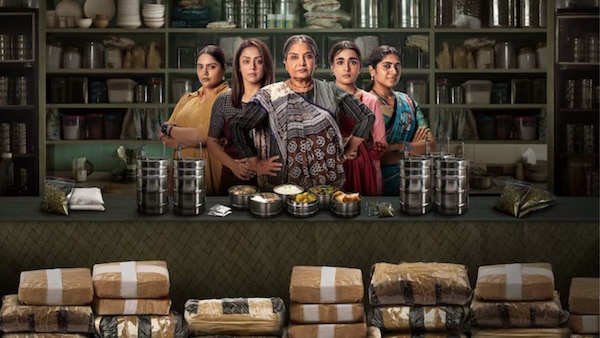
Promo poster for Dabba Cartel
Last Updated: 03.01 PM, Mar 04, 2025
FOR A SHOW centring on illegal opioids, cops tracking a pharmaceutical company for fraud and investigation being triggered due to an accident, very few people die in Dabba Cartel. It takes as many as six episodes for a gun to be fired; the blood comes even after. What is more intriguing, however, is that for a show centring on five women smuggling drugs, the filmmaking steers clear from being gratuitous, sentimental or excessive. There are no sweeping commentaries on gender or takedowns of conventions. This is not to say that the series serves without a bite but that it sharpens its fangs, despite, and because of, its resistance.
This is a feat because Dabba Cartel, the seven-episode series directed by Hitesh Bhatia, spreads across in all directions and for a while, looks impossible to be contained. A company is found supplying banned drugs in the country. This prompts an investigation by a middle-aged, stiff-neck government official (Gajraj Rao) who, along with a police officer, Preeti (Sai Tamhankar) finds the rot to be deeper than they had anticipated. Working in the office is Hari (Bhupendra Singh Jadawat), a middle-class resident of Thane who hopes to relocate to Germany. His timid housewife, Raaji (Shalini Pandey) runs a local tiffin business with their domestic help, Mala (Nimisha Sajayan) under the watchful but quiet presence of her mother-in-law, Sheila (Shabana Azmi).
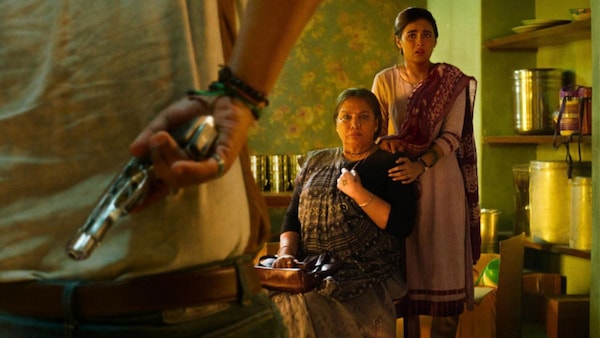
Apart from sending food, they also sneak in herbal viagra. This does not make their work clandestine as such till Mala gets embroiled in a drug cartel which expands their business and puts them at a perpetual gunpoint of a local goon. In the mix, two more women are thrown in: Shahida (Anjali Anand), a broker who met Raaji and Mala when they were looking for a house, and Varuna (Jyotika), an affluent entrepreneur whose husband (Jisshu Sengupta) is a senior officer in the same pharma company facing heat due to the controversy.
At all times, Dabba Cartel is enlivened with multiple subplots and too many things happening almost at the same time. It starts out as a folly when the writing (Vishnu Menon and Bhavna Kher) keeps leaning on easy accidents — characters keep bumping into each other as if Thane is a complex and not a city. Mala working at Varuna’s house makes sense but Shahida turning out to be the broker of both is a stretch. Then there is Hari who always ends up being the one person to figure out the solutions. His desperation lends a reason but it is also too convenient.
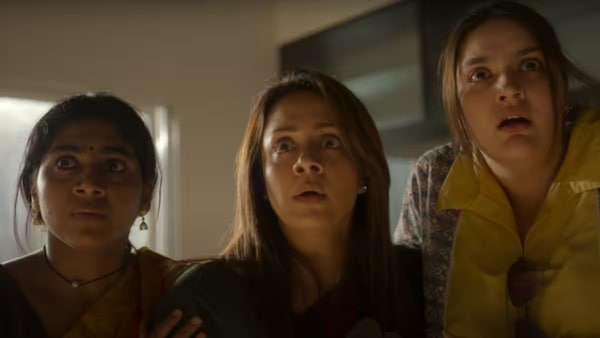
But these only last till the premise is set up. Once that is done, the series assumes a life of its own and gains a momentum that serves it well right to the end. This also allows for a fuller portrayal of the characters, which although too many, come across as flesh and blood people as the series unfolds. Dabba Cartel does not slacken its pace but takes its time to humanise them, resulting in depictions where all are prone to blindspots and none is perfect (the sparring between Varuna and Mala are some of the highlights of the show).
Bhatia’s show gains heft from recognising the social reality of the people it has assembled and not clubbing them as one entity even if what they want from life might feel the same. At one level it is. They all aspire for a better life. Even then, the texture differs and Dabba Cartel unravels attuned to this nuance. For Mala, she seeks respect from people who pin her to her profession, for Varuna it is tied to her identity. Once a successful professional, she is struggling to gain her footing after becoming a mother. For Shahida, the only religious minority in the cohort, the desire is to leave the country and live elsewhere. Raaji wants what her husband wants. It takes a while but it is never short of exceptional the way the series gathers these intricate threads without fusing them together into an easy clot.
What is more unprecedented is the quiet ease with which the personhood of the people comes to light. One must point out Sheila’s character whose revelations never come across as drastic swerves but an extension of herself. Granted Dabba Cartel gets noisier with time and bites more than it chews, but Bhatia’s new work also lends a lightness to the proceedings through a banger soundtrack (listening to Rabindra Sangeet rap in a Hindi show was not on my 2025 Bingo card) and an inventive use of the city. It is striking the way most of the scenes are shot indoors especially when the backdrop is Mumbai, a city so easy to conventionalise in a premise such as this.
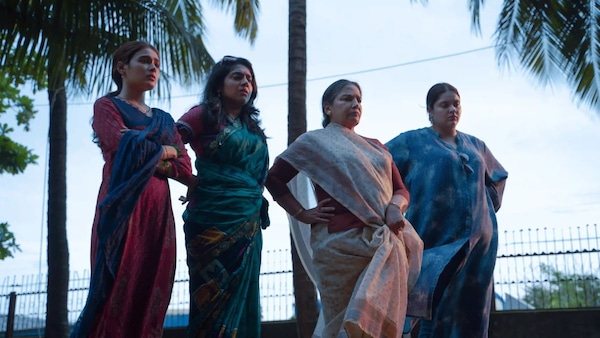
The filmmaker mostly sticks to indoors and by doing so insists on the subtext that for women, most cities look alike within the boundaries of their home. The apparent plainness aligns with Dabba Cartel’s another implication where the women do not become radically different beings once they start the business. It is a small resolve but the suggestion is extraordinary: women, every woman, are capable of things beyond what is expected of them.
It only helps that the series has assembled some exceedingly watchable actors. Azmi makes her streaming debut and is reliably good in a role that calls for more silence than words. Anand and Tamhankar share a lovely candour and offer memorable turns. Pandey, who bears a striking resemblance to Alia Bhatt, holds her own amidst the crowd, and Jyotika lets her face convey a multitude of emotions. The actor has been a regular in Hindi films of late but they have mostly been flower pot parts. This is not and Jyotika commits to it with rare, loving intensity.
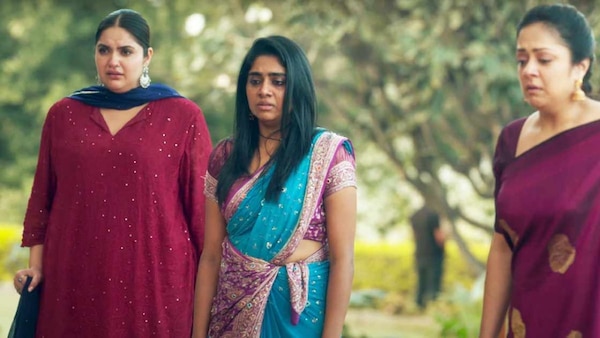
The triumph here is shared but also specific to Sajayan. The actor mostly features in Malayalam and Tamil language films yet as a Marathi financially-strapped woman, she is unbelievable in the show that demanded shedding of her familiarity. Sajayan does that and emerges completely new with local twangs stuck in her tongue. If Dabba Cartel wanders but never derails, it is because the women headlining it are capable of making even bad lines sing. Like most shows, it ends on a cliffhanger even as predictability bleeds in the narrative. A second season might or might not happen, but the women make it easy to root for it.
Dabba Cartel is currently streaming on Netflix.

 Premium
Premium